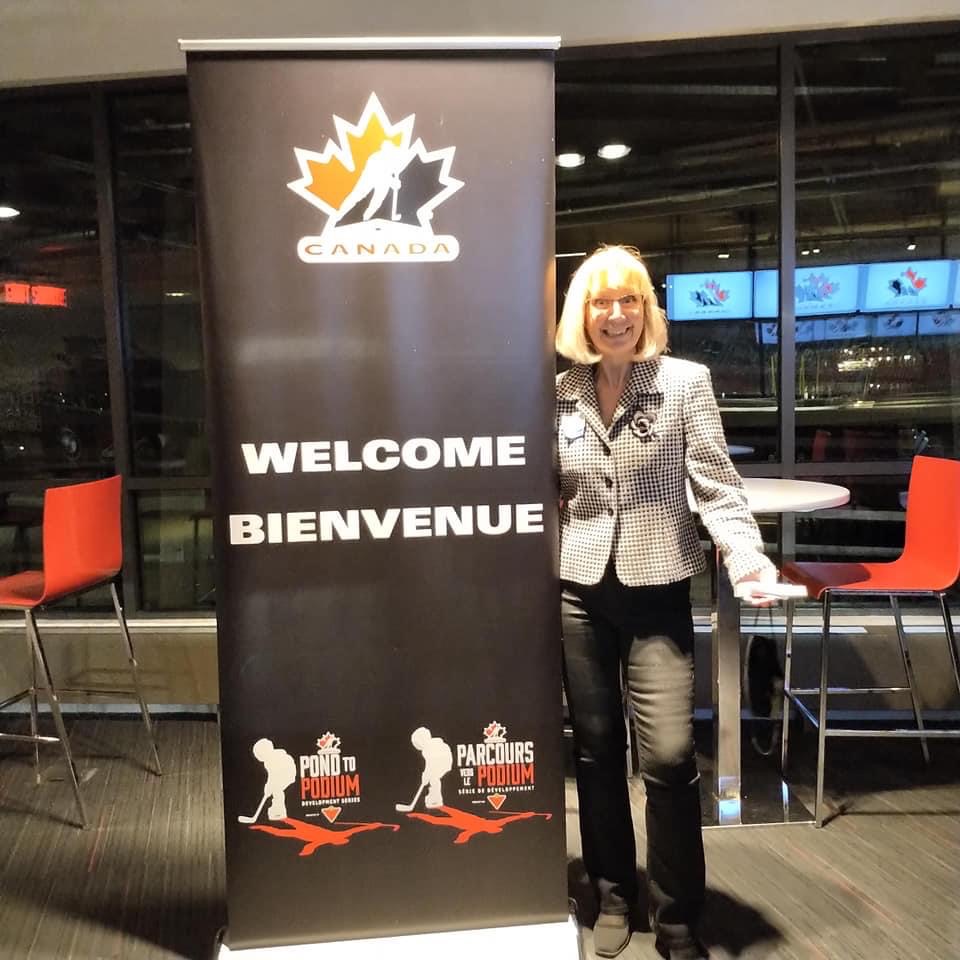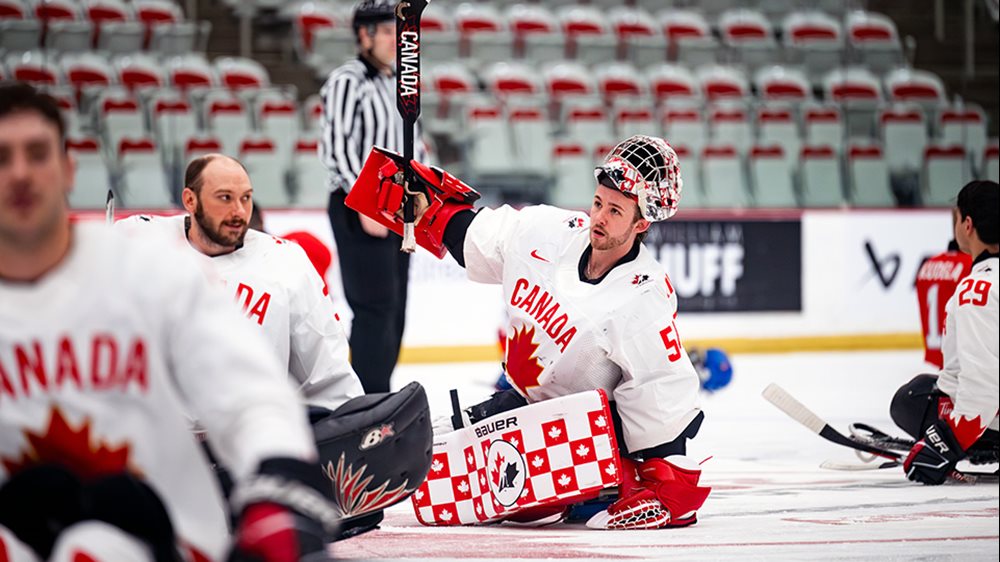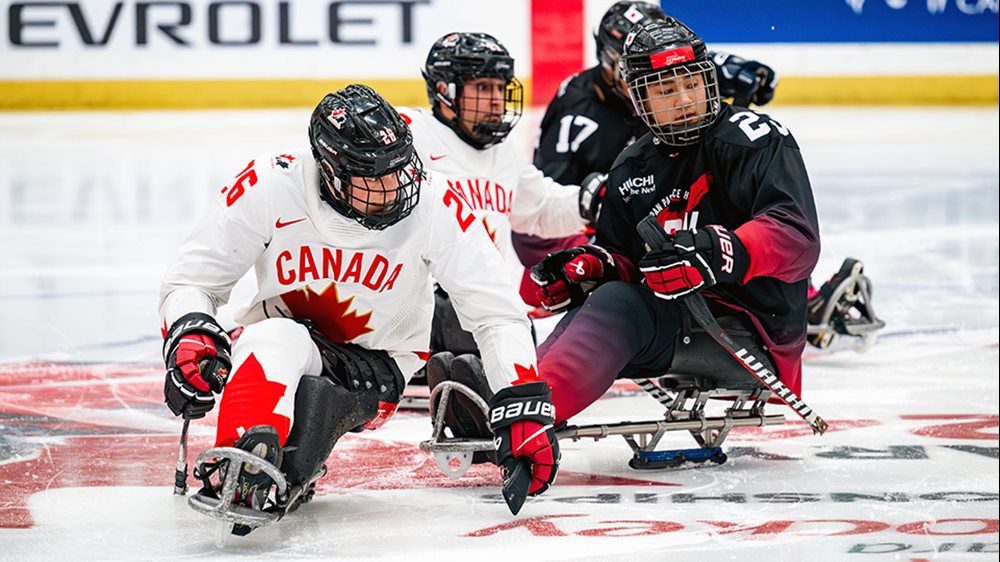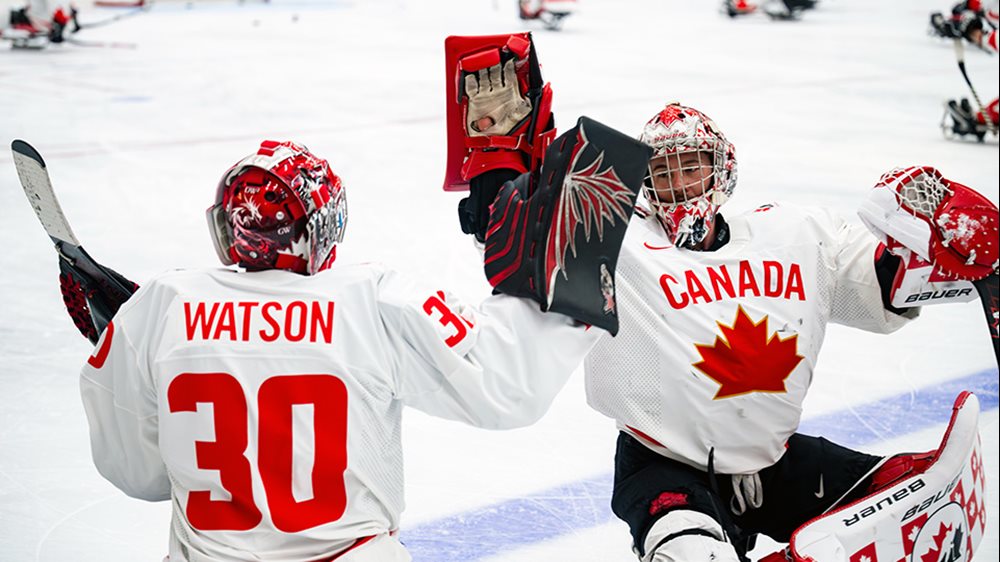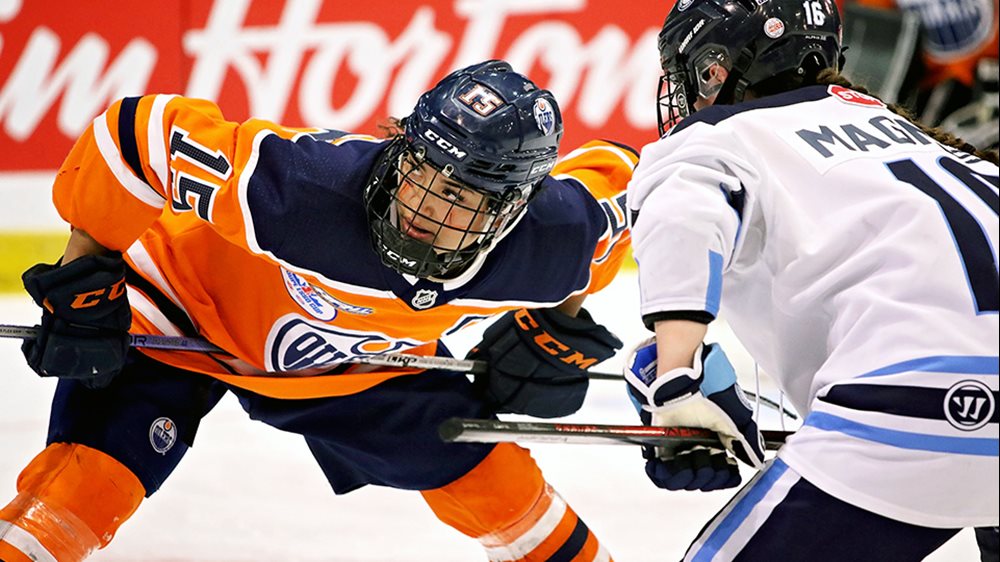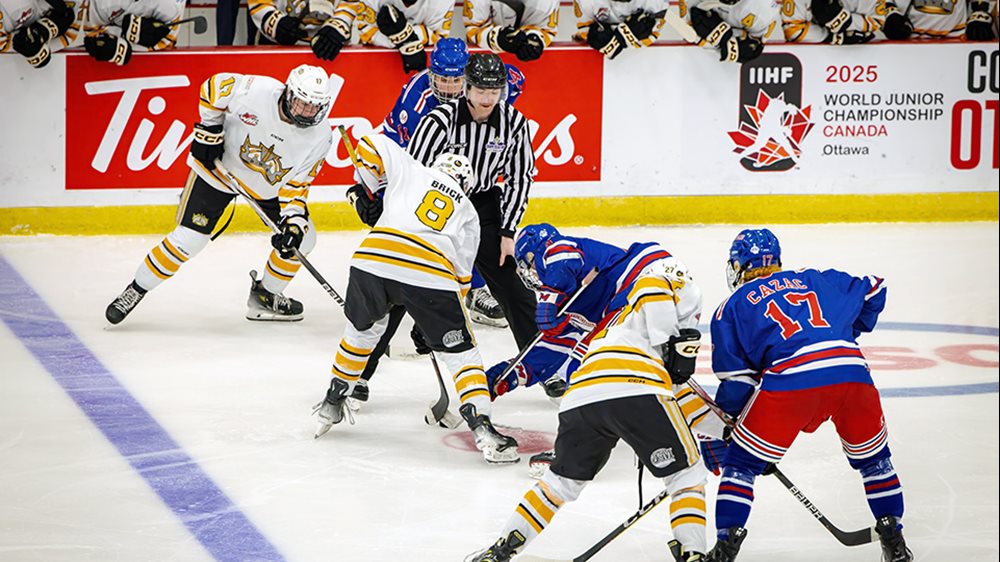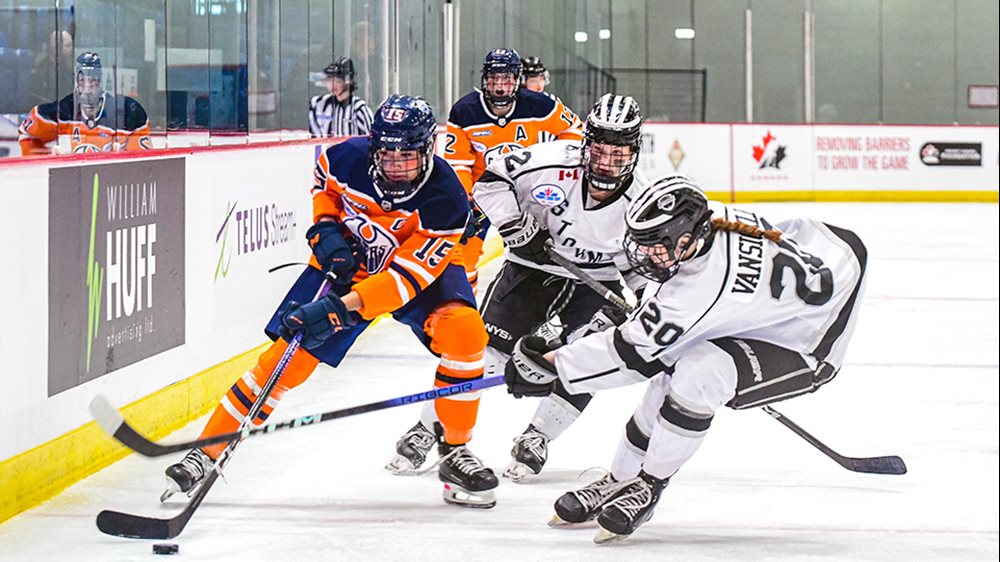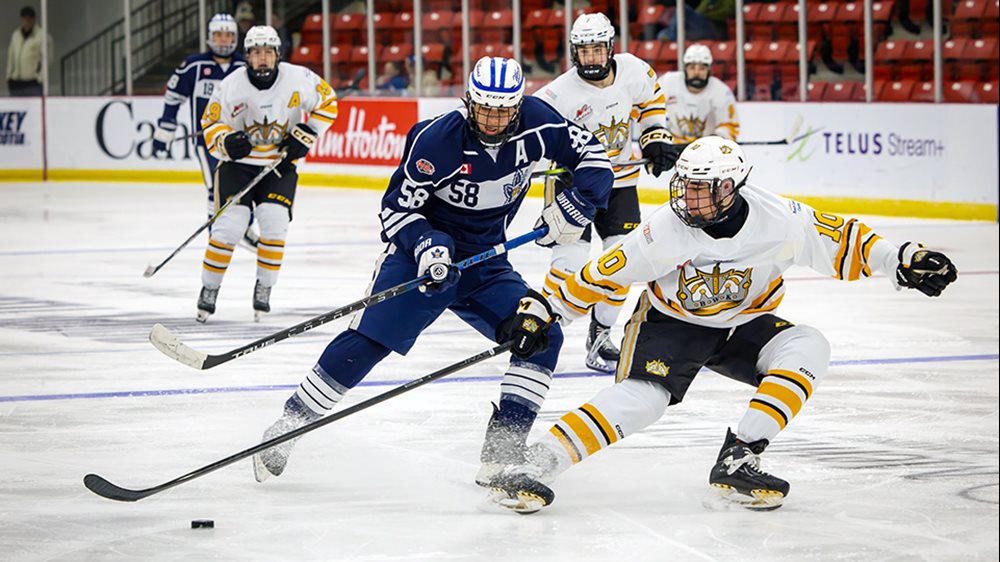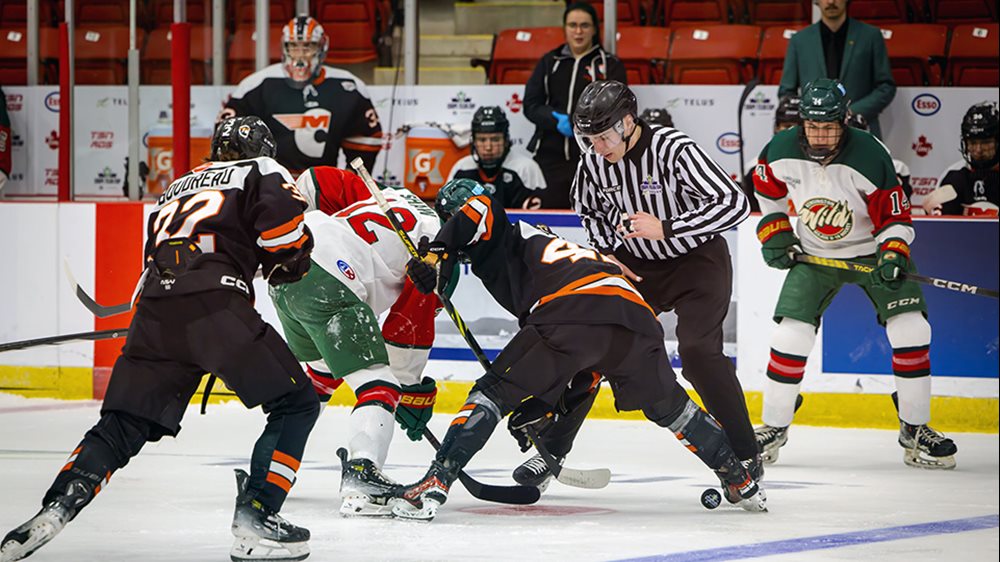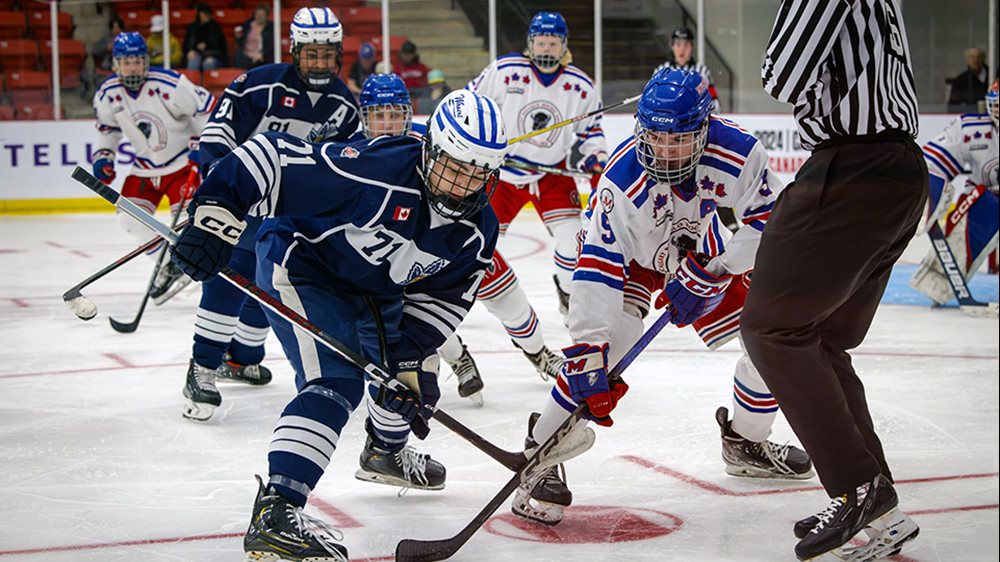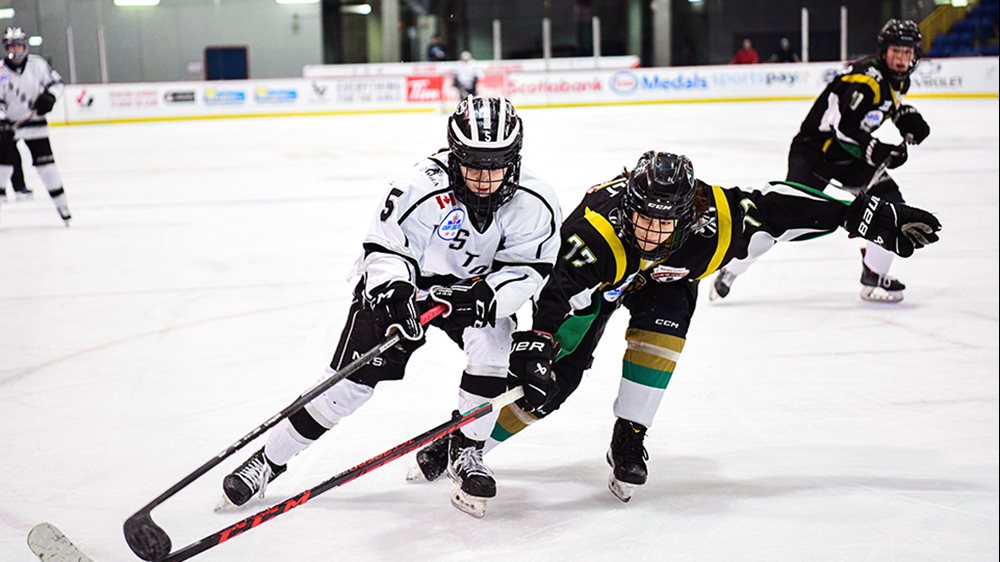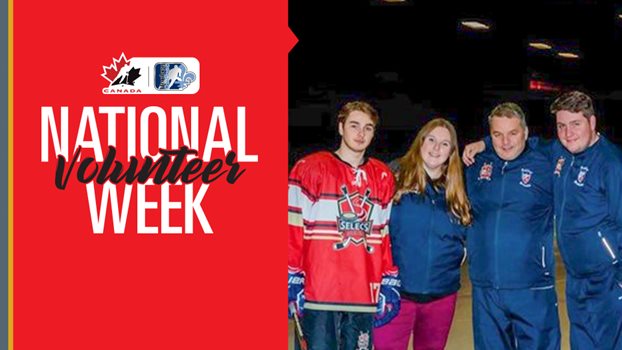
A volunteer’s passion
A young communications student with a love of the game, Érika Bosch shares her experience as manager with the Collège Français de Longueuil
Great opportunities come to those who give back to the game. Érika Bosch can attest to that. She pursued her passion for hockey as manager with the Collège Français de Longueuil, while accumulating professional experience in communications.
For National Volunteer Week, we spoke with the Université du Québec à Montréal (UQAM) public relations student to get an insight on her experience as a minor hockey volunteer.
Why do you volunteer, and how old were you when you first started?
When I was 13 and 14, I volunteered for the Saint-Hubert International Women’s Tournament, but it was more of a hobby for me. It was with the Collège Français that I truly got involved in hockey. My youngest brother played with their Midget Espoir team.
It was my first experience as team manager. I thought the timing was right, and I’m passionate about the game.
I study public relations at university. Volunteering allows me to gain experience in this field. I have always wanted a career in the hockey world and in communications. As team manager, I learned a lot while doing the small things.
And as a former minor hockey player, I could share my love of the game with the kids. I wanted them to experience the same kind of hockey seasons I did or wish I did.
What was your role as team manager?
A team manager ensures communication between three parties: parents, players and coaches.
We used to do line-ups using game sheets, but with all the programs nowadays, I can post them online. Being team manager also means administering everything from budgets to fundraising, if needed.
I organized team-building activities for the players, the Christmas dinner and the end-of-year party. I was also in charge of the team’s branded merchandise, placing orders, liaising with service providers and processing payments.
Why did you choose to get involved in hockey specifically?
I come from a true hockey family. As a baby, I wore my hockey jersey in the stands. My uncle Patrice Bosch coached in Junior AAA and Major Junior, as well as for Team Canada [at the World Junior A Challenge]. He was also involved with Hockey Quebec.
We spent our weekends at the rinks. One of the perks of knowing the coaches is being invited backstage and seeing the players answer questions after a game. It gave me a glimpse of the other side of the coin and everything management work requires.
What do you get out of your volunteer experience?
I think it’s a very nice first professional experience. I saw that when you give it your all, you get a whole lot out of it. You gain experience.
I have learned a lot, from budgeting to managing cash flow and producing Excel reports for the parents. I want to give back to my community, help others and support the players along their hockey journeys.
Communications vary from one organization to the next. Hockey is such a dynamic world. So much can happen and things may take unexpected turns. I’ve learned so much.
Tell us about your volunteering experience with your family last year.
It really is a passion shared by my whole family. My youngest brother, who wants to coach, and my dad teamed up behind the bench. I had two years’ experience as team manager, so I took on that role again.
What’s next for you? Do you plan to stay involved in minor hockey?
This is the final year of my BA (bachelor of arts degree), so I’m in a transition. I am looking for job opportunities in the sports world. I would obviously like to stay involved, depending on my schedule.
I dream of living off my passion for hockey. If I could manage a hockey team all year around, I would. I found out just how exciting and rewarding it can be to give back to the game and dedicate myself fully to it. I could see the kind of impact you can have on a hockey season and how well it runs. I will look for opportunities, whether in a volunteer capacity or a full-time job in the hockey world.
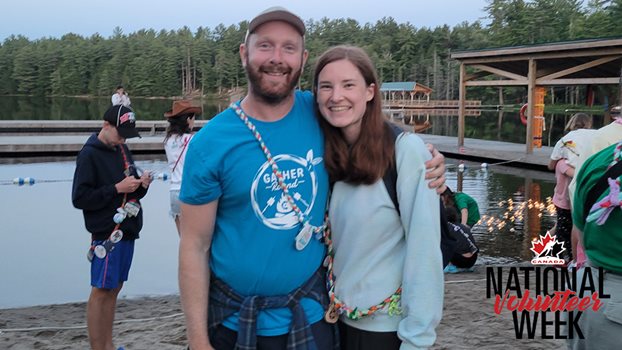
In my own words: Adam Dixon
The Team Canada veteran talks about the summers at Campfire Circle that changed his life, and why he’s still giving back to the camp as a volunteer
Growing up and going to school in Midland, Ontario, I was always The Kid With Cancer.
I mean, it makes sense. Midland is only 17,000 people, and there weren’t many kids who had cancer.
I was diagnosed with Ewing’s sarcoma when I was 10. It’s a rare type of cancer that typically attacks the bones in your legs and pelvis. Mine was in my right tibia. It was removed and replaced with a donor bone, along with a metal plate and multiple screws.
So I was a kid, and I had cancer.
But when I went to Campfire Circle, I was so much more than that.
Campfire Circle is a summer camp for kids with cancer, or those who have been affected by cancer – like kids who have lost siblings. Everybody was The Kid With Cancer, so your other traits got to show through. I was The Athletic Kid, I was The Fun Kid. It was my little two-week escape every summer.
I have no idea how my parents found the camp, I just remember I was signed up and on the bus. And the six summers I spent there changed my life.
At camp, I was able to just be myself. I wasn't the kid that was timekeeping the hockey games because I couldn't play anymore. I was the kid that was involved. I was the kid that was running around, having a good time, doing stuff that my mom would never have allowed me to do at home. But at camp, where there are doctors on site, there's a little bit more freedom. If I break my leg, everything's going to be fine.
The camp is so well set up for people that were in my situation. You could have chemotherapy at camp. It's accessible, so you can do stuff that's not an option for most kids at home.
It’s a breath of fresh air, in more ways than one. The camp is in Muskoka, so you couldn’t ask for a more beautiful place. And just to be outdoors all day, yes please. We'd play road hockey. There's a giant slip and slide. And most of all, it’s just the time spent with your fellow campers pulling pranks on the other campers or the other cabin groups.
Again, it changed my life.
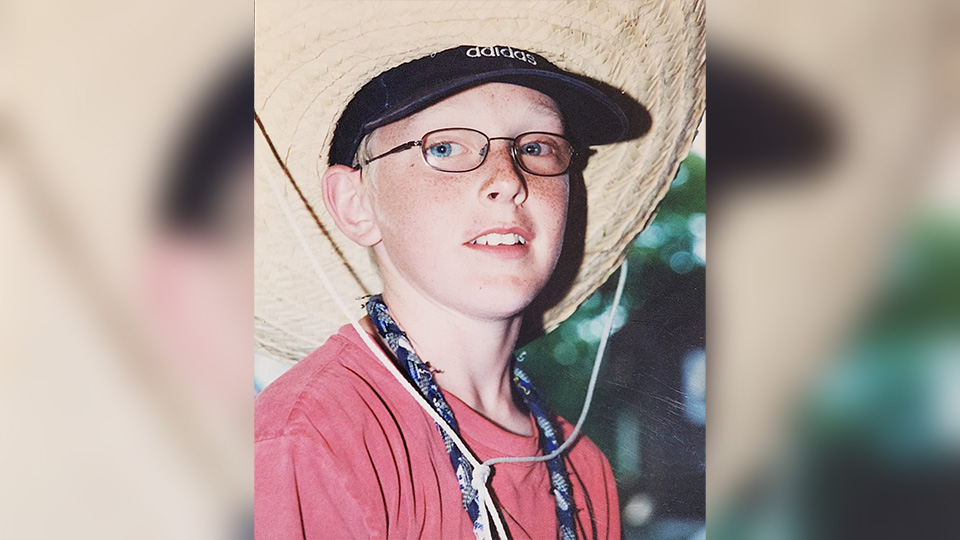
For a lot of years, para hockey was everything. All of my vacation time went to hockey. And I wouldn’t trade that for anything. I’ve been able to travel, win world championships, play at the Paralympics. I’ve spent most of the last two decades wearing the Hockey Canada logo on my chest and representing my country. Amazing.
But after the Paralympics in 2018, I started focusing on other things in my life. And one of those was Campfire Circle. I had signed up to volunteer prior to the COVID-19 pandemic, but the camp was shut down for a few summers because it’s a very vulnerable group.
As soon as we were able to go, I was back. I've been there for two summers now as a full-time volunteer. My partner and I are both volunteers. We've done some weekends at camps as well, which is a fun little way to escape the grind of life.
I was a cabin counsellor my first year and I also ran the wood shop, helping kids stay safe. I can just imagine people I know reading this and laughing… I’m basically a giant kid. Who would trust me with sharp tools?
It was a little daunting at first, but I figured it out. Last summer, they needed someone to help out with a whitewater canoe trip. That's something I've never done before, but they needed someone, so I'm in. Just point and shoot, right? I ended up spending two weeks on the French River. It was outside of my abilities, but we figured it out. This summer I'm back as a cabin counsellor, so I'm just a stay-at-home parent, basically. I just run with the kids all day, so that's pretty fun.
I do have one specific goal for this year, though. My birthday is August 13, so when I was a kid I’d always have my birthday at camp. When you're a camper you get to pick three counsellors to throw in the lake. As a counsellor, I have yet to be cool enough that I get thrown in the lake, so this summer I have to figure out which kids have birthdays and then really pester them so they'll throw me in the lake.
I really want to get chucked in the lake.
One thing I’ve been asked, as someone who is “in charge,” is if there’s pressure on the counsellors. Some people may think that there’s this huge need to make it an unbelievable experience because of what these kids have been through, but it just happens naturally. The kids have fought cancer. That's the worst thing that's probably ever going to happen to them. Going to camp, that's easy. They create their own fun. Some of it is built into the camp atmosphere, sure, but when that thing that makes you “different” at home no longer means as much, you're just yourself and that's pretty cool.
I’ll admit, sometimes volunteering can be a bit selfish. Getting away from society for two weeks is a great little break. I can be silly, I can have fun, I can not be an adult for 14 days. But once I’m there, really, it’s about the kids.
I know how much fun I had when I was 11 years old, and I want to bring that same amount of fun to the campers. I think about when I was a kid and I think about all the counsellors that I really looked up to, and I try to bring a lot of the same energy. Does it work? Who knows, you don't get feedback from the campers. They just make fun of you. But yeah, I think I do a pretty good job.
I’m going to finish with a plea of sorts. Volunteer. Get out and give back. It could be a summer camp. It could be a hockey tournament (I hear the World Juniors are coming back to Canada this winter). It could be anything. It’s about making a difference.
There are so many events around the world that can only run because of volunteers. It's an incredible way to get out and meet like-minded people, people that want to give back to their community.
So why not volunteer? It's awesome. But don’t take my word for it… get out and do it!
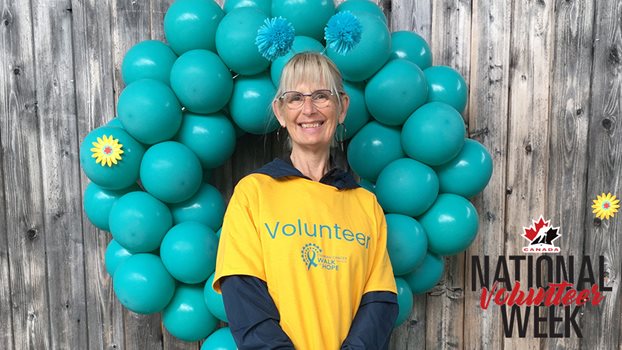
The gratitude for volunteering
After making the choice to begin volunteering to make friends in a new town, Susan Sloan can’t imagine what her life would be like without giving back to her community
Susan Sloan can’t imagine her life without volunteering. In fact, she feels her life would be the complete opposite of what it is now if she hadn’t started donating her time.
Throughout her life, Sloan has had a variety of different jobs, from working in a bakery to an IT specialist and a fitness instructor at the YMCA. After moving to Orleans, Ontario—a community in the east end of Ottawa—in the early 2000s, Sloan took a one-year contact with Volunteer Canada that would change the course of her life.
“I thought since I’m working as their membership manager, I probably should know a little bit more about this volunteering thing,” she says. “But I had already decided that volunteering was the route that I wanted to take, really just to start making friends because I literally had none.”
Her first volunteer position was with Canadian Heritage to help with their Winter Lights Across Canada event. From there, she learned about Winterlude in Ottawa and decided to volunteer for it as well. By then she was on a roll, so she signed up to help with the Canada Day festivities.
“Those were my signature events—every year, with the exception of COVID, you
would find me at all three of those events come hell or high water,” she
says. “That was my core, and they are still my core to this day: 22 years
later, I’m still volunteering with Canadian Heritage.”
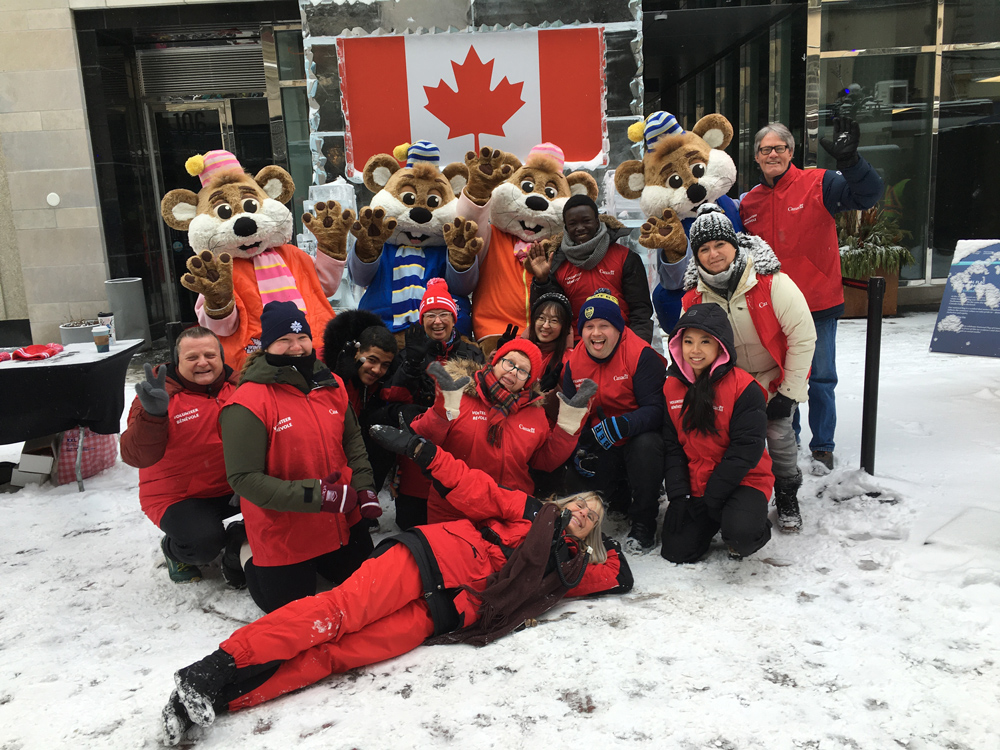
Interspersed between her three core events, Sloan got involved in “little adventures” to explore new volunteer experiences in areas she was interested in.
“I loved sports, so I would pretty much put myself into any event that needed volunteers,” she explains. “In Ottawa, it’s like a laundry list of opportunities; you could be busy every weekend starting on Thursday.”
She began with a volleyball tournament, then taught Zumba at Relay for Life. Soon her volunteer experiences began snowballing into more new opportunities in sports.
“Sports has always been my happy place,” she says. “Being in a small community and in Ottawa, once you are known and you’re affiliated with certain events, you start to get asked to work other events and help out.
“I’ve had some amazing opportunities that I would never have had anything to do with had I not been a volunteer.”
When Canada’s National Women’s Team came to Ottawa in 2021 for the Rivalry Series, Sloan volunteered to help with the Olympic jersey reveal and managed guests coming into the game.
“It was really delightful working with Hockey Canada,” she says. “I really appreciated and respected the respect that we received, and the gratefulness for just doing something that was so minor.”
Later this year, the 2025 IIHF World Junior Championship will be hosted in Ottawa. Through her connections gained from volunteering and her reputation in the community, Sloan was presented with a new opportunity: to become the volunteer co-chair for World Juniors. And coming from a family that loves hockey and watches the tournament every year, she agreed.
“The fact that I was asked to do [World Juniors] … they chose me. That was a
choice and to be that choice is probably one of the most rewarding things in
the world. And none of this would have happened had it not been for
volunteering.”
When the puck drops in December, Sloan is most excited for the tourists and guests to experience what Ottawa has to offer.
“It’s so amazing because as volunteers, you’re in the chaos of everything,” she says. “I love the diversity it brings to the city. It brings a certain energy that the only way you’re going to know what it’s like is if you’re there. It’s amazing to be a part of something.
“People are coming in from all over the world, and you get a chance to mingle with them. You get a chance to show up for your city.”
With her experience in so many volunteer positions, Sloan has a thorough understanding of the value every volunteer brings to the table.
“The synergy that’s created when you are with like-minded people is magical. You have volunteers who, without them, no event would happen,” she says. “IIHF wouldn’t run without their volunteers. Canada Day would not run without its volunteers.”
As her experience allowed her to help others begin their volunteer journeys, Sloan has seen people blossom in ways they never thought was possible. And for Sloan, there are no words to describe the gratitude she has for making the decision to begin volunteering 22 years ago.
“Everything that I am, everything that I will be, is because of volunteering,” she says. “There are not many things in our lives that we put this much effort into that the rewards are amplified upon receipt. I can’t imagine what my life would be like without volunteering.”
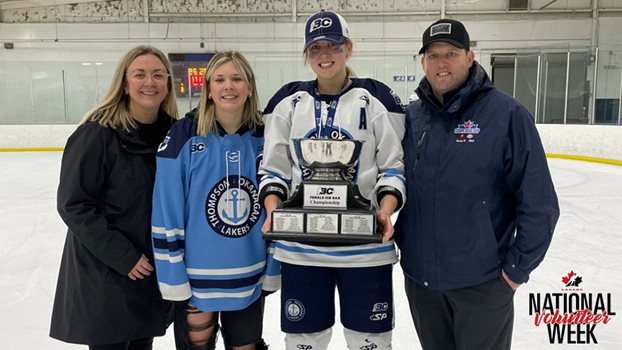
'You’re always fighting for them’
For more than two decades, Braden Robertson has volunteered his time and given financial support to ensure the growth of girls' hockey in Vernon
For more than two decades, Braden Robertson has been a stalwart figure in the Vernon, B.C., hockey community.
Whether it’s been coaching minor hockey, helping his daughter’s hockey team or in his current role as co-chair of the Esso Cup host committee, Robertson has dedicated countless hours giving back to the game he loves.
“I started off playing minor hockey like every other Canadian kid and just evolved from there,” Robertson says about his passion for volunteering.
After his playing days were over, Robertson got involved with coaching teams in the Vernon area in 2001. He took a few years off when his daughters Myah and Hannah were born but got back behind the bench when Hannah began playing hockey.
“Once my daughter started playing hockey, I got back into coaching. Head coach, assistant coach, I did all of that for quite a while,” Robertson says.
However, as Hannah, who will participate in the 2024 Esso Cup with the Thompson-Okanagan Lakers, grew older and began playing at a higher level, Robertson took a step back from coaching. He instead found other ways to stay involved, working to help secure sponsorships for the Lakers over the past couple of seasons.
“When your kids get older and they play at a higher level, they have higher coaching, more than my experience,” Robertson says. “You’ve always been a part of the game, and now you’re like ‘Where can I fit in, how can I help out?’ and that’s my part, helping out wherever is needed.”
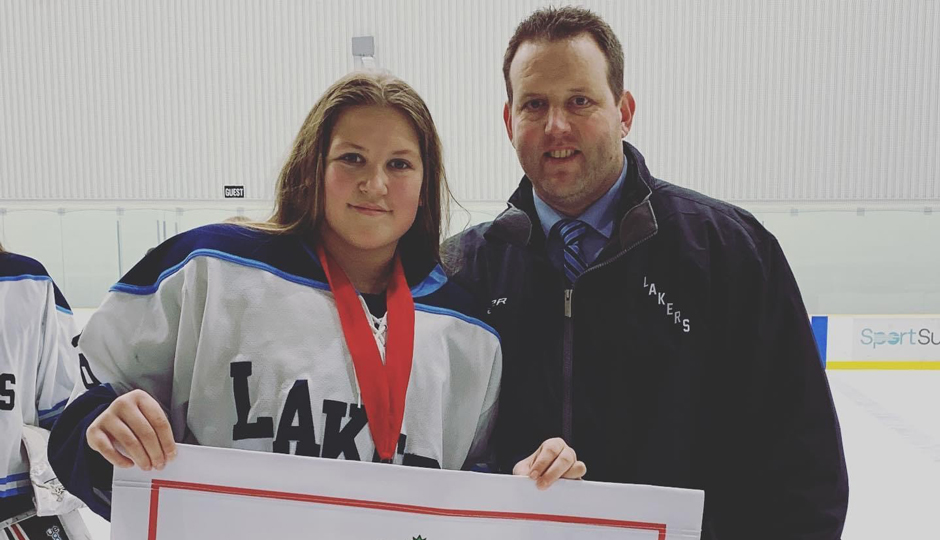 And that’s exactly what he’s done. This past summer, Roberston built a dressing room for the Lakers inside Kal Tire Place. A business owner and contractor by trade, Robertson covered the majority of the construction costs — close to $7,000 — and secured sponsorship funding to cover whatever was outstanding.
And that’s exactly what he’s done. This past summer, Roberston built a dressing room for the Lakers inside Kal Tire Place. A business owner and contractor by trade, Robertson covered the majority of the construction costs — close to $7,000 — and secured sponsorship funding to cover whatever was outstanding.
“I wish we could have done this sooner,” he says. “It leaves a bit of a legacy on my behalf of the sport that I love playing and watching and it was nice to give back. It's nice that they have a home instead of having to use a broom closet or something. They now have something that they take pride in and that’s awesome. You’re always fighting for them.”
Robertson has also led numerous sponsorship initiatives over the years, raising thousands of dollars for the Lakers. Robertson says he’s proud of how the people of Vernon have come together over the years to ensure the girls have a chance.
“It obviously pays some of the bills that it helps families out the parents out, lowers the cost, brings the community in with the team,” he says. “I can’t say enough about the community I live in. Their mindset with kids and sports here is huge. It’s a very giving community. We’ve surrounded ourselves with very good people. We love giving back and I do too.” Kevin Bathurst, who shares Esso Cup co-chair duties, says without Robertson, the Lakers dressing room never gets built.
“This team finally has a home and it’s been a long time coming,” says Bathurst, who is also the executive director of hockey operations with the Greater Vernon Minor Hockey Association. “I think it is a legacy that Braden can hang his hat on. That dressing room is going to be a mainstay in the community for a very long time. The girls can walk down the hallway where the dressing rooms are at Kal Tire Place and see a Lakers logo, not just a Vernon Vipers logo. It’s through some of Braden’s hard work that they’ve got the recognition and the facilities that these girls deserve.”
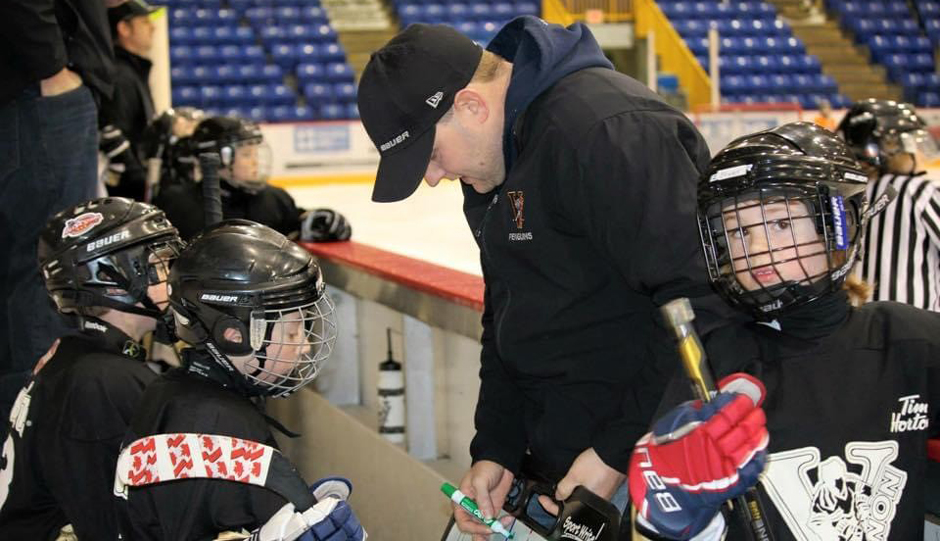
Today, Robertson serves alongside Bathurst as they work to ensure Vernon and Kal Tire Place are ready to host Canada’s Women’s U18 National Club Championship. He’s excited for the girls who will be participating in the tournament and the impact the event will have on the broader community — profits will be going towards the creation of a post-secondary scholarship fund and a grassroots development fund that will support girls’ hockey in the region.
“I'm looking forward to all the kids coming. Hopefully we put a good product out there and they enjoy it because this is one of the biggest tournaments these girls are ever going to play in,” Robertson says. “We are giving back to the community through scholarships, and we have a grassroots program that will help young girls get into hockey that maybe couldn’t afford it. It will help them out with the bills, whether it is hockey equipment or team fees, league fees or whatnot.”
Bathurst says Robertson has been the “flagship volunteer” for girls’ hockey in the Vernon area and that his dedication and commitment to the game is unparalleled.
“You couldn't find a better volunteer and champion of female hockey than Braden,” says Bathurst. “He really is an example for many of us to follow in terms of the growth of the female game.”
At the end of the day, Robertson says giving back to the game he loves so much isn’t just about hockey, it’s about shaping the next generation of adults and having a positive impact early in life.
“It’s about trying to create good human beings, members of society that can move on and work hard,” he says. “It’s about finding out what they are good at. It’s about being a good human being and I think hockey and all sports are that way. Sometimes people lean too much towards the sport itself, but we are raising these young adults that will have to contribute one day.”
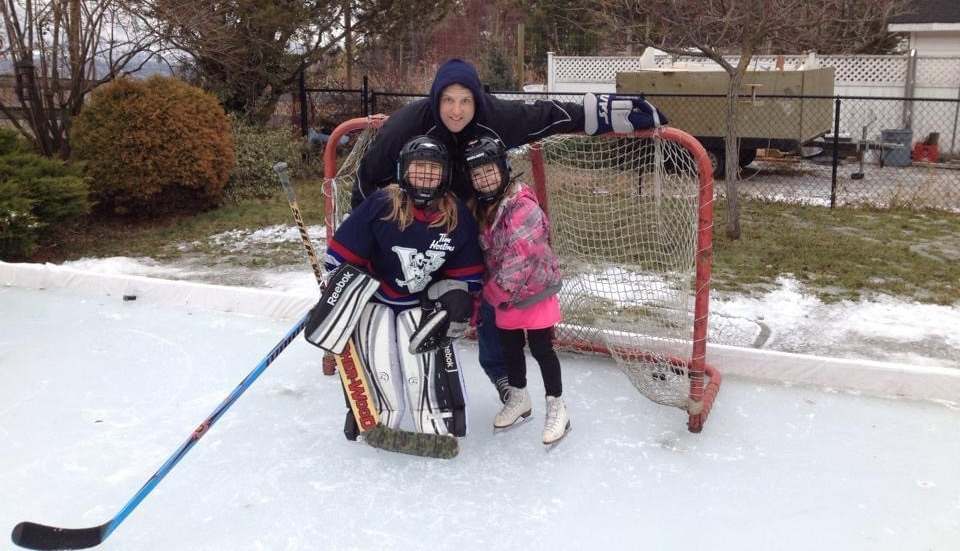
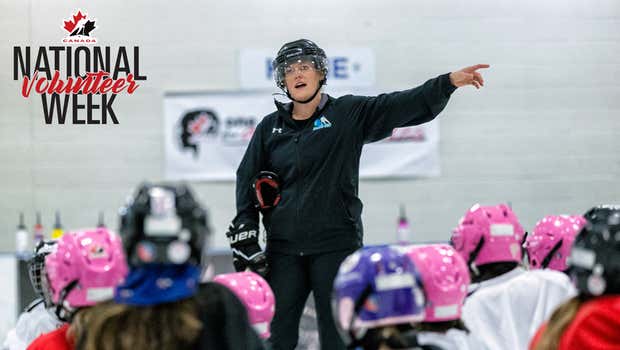
Making an impact in the North
A game-changer in women’s hockey, Kaylee Grant tirelessly gives her time across the territories, volunteering to ensure opportunities exist for women and girls
The first thing Kaylee Grant did when she moved to Yellowknife was find a hockey team.
The operating engineer took a one-year term to gain experience in her industry. Twelve years later, she’s still in the Northwest Territories and hockey has been a reason why she calls it home.
“You gravitate to what you know, and I knew sports,” Grant says. “When you join a sport, you instantly have 17 friends and a group where you feel accepted through a common goal and interest. When I moved to the North, I didn’t know how else to meet friends, so I went to the rink right away.”
Grant grew up around the rink in Antigonish, Nova Scotia. The community was also a hockey hotbed, supporting its Junior A, Junior B and university teams. Being around that passion and community made hockey an important part of her life.
“Playing hockey is what we did,” Grant says. “The community rallied behind our teams and the rinks were full, the atmosphere was great, and hockey was so prominent.”
She played minor hockey in Nova Scotia before moving to Newfoundland and Labrador to play at Memorial University. At 23 years old, she made the move to Yellowknife and knew she would find her community inside a rink.
“I find that the easiest thing to do when you come to a new place to meet people is through sport,” she says. “With joining a hockey team, I was already creating a group of people that were like-minded in interests and similar age. Plus, there are so many opportunities in the North to grow as coaches, players and mentors that have been so helpful.”
Grant’s love for the game wasn’t just as a player—she expanded her knowledge
by getting into coaching while in Nova Scotia. She started as an off-ice
coordinator with the Antigonish Bulldogs women’s under-18 team.
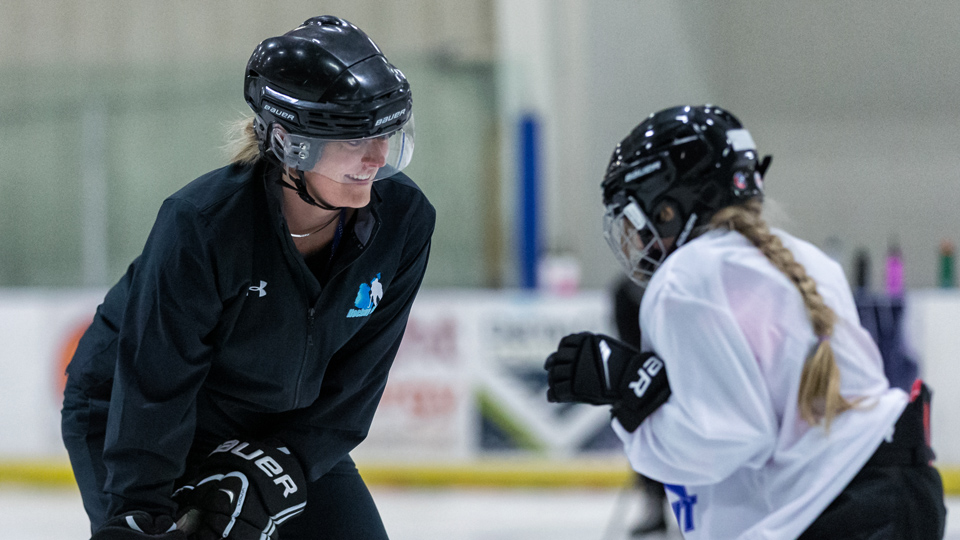
She did her Coach Development 1 training before getting her High Performance 1 training and evaluation certification. She continued to pursue additional coaching certification and training over the years to educate herself and give back to her community.
“I think seeing the female game continuously grow and develop that keeps me interested,” Grant says. “I love to see the progress in my players. I love seeing these players grow and adapt as individuals. Seeing them get involved in coaching is the coolest part.”
Her coaching philosophy is to develop a player’s passion for the game, be a role model and create an environment that is positive for women and girls.
Coaching and mentoring young girls are important to Grant, and she saw that path was through high-level opportunities, particularly by becoming a facilitator to drive more players into the coaching route. She has been working with Hockey North and the Hockey Canada Women Master Coach Developer program, which is focused on removing barriers to coaching education for women.
“Kaylee has volunteered at pretty much every level and she’s getting more involved with training coaches and being a clinician, which is an amazing progression for her,” says Kyle Kugler, executive director of Hockey North and a close friend of Grant. “She’s a great ambassador for hockey by giving back to other coaches through her experiences and helping with their development.”
Through being a volunteer coach, Grant has been able to experience some highlights with her teams, including as head coach for the Arctic Winter Games and Canada Winter Games, and as an assistant coach for Team North at the National Aboriginal Hockey Championship.
“Hockey North has given me so many opportunities and having that support has impacted me as a coach,” Grant says. “I enjoyed every year with those territorial teams and those experiences are a very big reason why I stay here – the coaching opportunities and knowing that we continually have room to grow.”
Another event that Grant was a key volunteer for was the inaugural One For All festival held in Yellowknife in February. It was a four-day event for women and girls from across the N.W.T. and Nunavut that included goaltending clinics, on-ice scrimmages and other off-ice experiences. The event was launched in partnership with Hockey Canada and Hockey North to celebrate the sport and grow grassroots hockey in the North.
“Kaylee is one of our co-leads in the North, and when we set out to deliver this programming in Yellowknife, it was a no-brainer that she would be involved. And typical Kaylee, she just runs with a task and completely owns it,” says Katie Greenway, manager of women’s and girls’ hockey with Hockey Canada. “To have champions like Kaylee that dedicate themselves to their community and sport is so important.”
Giving back through coaching is just what Grant does—it’s like a hobby for her and she does it for others and to see more women in the sport, not for what it could bring to her.
“I’ve known Kaylee for a few years now and she has so much on her plate, but she never says no,” Greenway says. “She doesn’t do it for the accolades, but out of the goodness of her heart with a smile on her face. She’s fantastic and is really impacting everyone that she comes across.”
Grant’s impact on hockey in the North has been felt by many of the girls she has coached, mentored and played with over the past 12 years, but it’s the bigger picture that is most important to her.
“I’m not going to say that myself, individually, has drastically impacted female hockey in the North. I think I am a very small portion of what’s been going on in the North in the last 10 years,” Grant says. “I would like to think that I have helped develop more female coaches and I’ve been a good role model. I think if I have impacted hockey in the North, its pushing players to want to coach a little bit, but it’s a collective—everyone has left their mark on the female game.”
For Kugler, as the lone administrator for Hockey North, having volunteers like Kaylee is so critical to the work and development of hockey players.
“I think volunteers are essential for the delivery of anything in small communities in the North,” he says. “[Kaylee] takes on more than we even realize. Coaches have a huge influence on teams and athletes and she’s a positive role model and advocate for female hockey. She’s selfless with her time and she’s just an awesome person.”
Interested in becoming a coach? Visit HockeyCanada.ca/Coaching, or contact your local hockey association or Hockey Canada Member for more information.
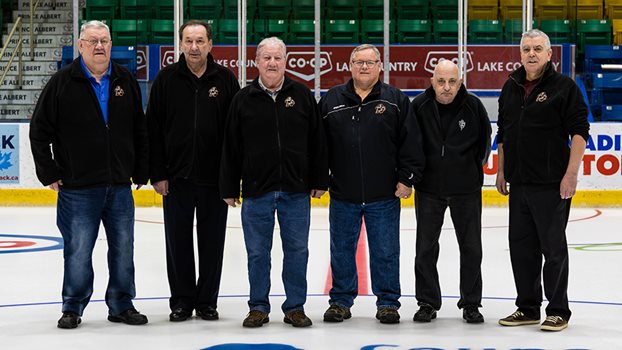
Volunteering as friends
It was friendship that inspired a group to begin volunteering as off-ice officials, and the Prince Albert hockey community is grateful for their dedication each year
There’s nothing better than volunteering with friends.
It was friendship that inspired Garry Schwan to get involved in off-ice officiating in Prince Albert, Sask., just over a decade ago.
“A friend of mine was running the clock and they never seem to have anybody that wanted to work in the penalty box,” Schwan says. “So, I started working and then kept going [after my friend stopped volunteering.]”
This group of mostly retired friends is now the backbone for off-ice officiating in Prince Albert, with some volunteering in minor hockey for almost 30 years, like Lloyd McBeath. You can find this dedicated crew volunteering for all the Prince Albert Raiders, Prince Albert Mintos and Prince Albert Bears games.
“I just liked the sport and getting involved,” McBeath says. “I enjoy the company with everyone.”
Since this crew has been working with the Prince Albert Bears for multiple seasons, the team was asked to volunteer at the upcoming Esso Cup and agreed to be there for all 19 tournament games.
“It’s fun to watch,” volunteer Dwight Sachkowski says about watching the Bears. “It is good hockey. The team that’s representing the province is Regina this year. They’ve got an awesome team. They’re going to be tough to beat.”
Another perk to volunteering with friends? Sharing laughter and making memories during every game together.
“We have a lot of fun bugging each other. We get along really well,” Sachkowski says.
“We do a lot of joking around during the games,” adds McBeath. “It's enjoyable.”
“We buy our 50/50 tickets,” Schwan says. “We’ve never won, but we’ve been buying them every game.”
The dedication of these volunteers has not gone without notice in the Prince Albert community. The host committee for the 2023 Esso Cup has expressed its gratitude for having such an eager group willing to volunteer their time for the tournament in addition to their work all season long.
“The girls and the management directors, they appreciate it,” Schwan says. “We get invited to their banquets every year. They’ve treated us pretty good.”
Volunteerism is the backbone of minor hockey, and if you’re looking to be a part of minor hockey, Sachkowski has some advice.
“Get involved,” he says. “It’s as simple as that.”
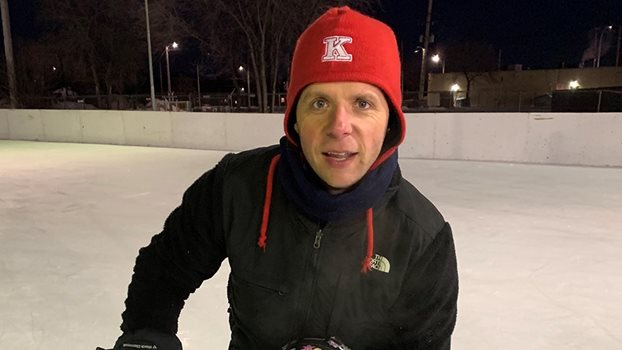
For the love of the game, for the love of community
A hockey dad and tireless contributor to community sports in Winnipeg as a coach and so much more, Steve Wach puts the focus on finding a balance between getting better and having fun
Coaching youth sports takes time, effort, patience, the ability to develop and foster relationships, and so much more.
Steve Wach has all of those attributes. Wach is a father of three in Winnipeg and president of the Corydon Community Centre. He oversees U7 and U9 programs at the centre and, during the 2022-23 season, coached three teams – as head coach of U7 and U9 teams, and an assistant coach on a U11 team.
Busy? You bet, but Wach wouldn’t have it any other way. He’s proud to be able to witness, firsthand, the tremendous impact community involvement has on kids in the Manitoba capital.
“We’re very fortunate to live in an area that has a rink. We have a rink that’s over 60 years old in our community centre and it is the central hub of the community,” says Wach. “We run a lot of programming out of there with a lot of kids involved with all sorts of skill levels. Some kids are striving to become as good as they possibly can be, while some kids and parents are at the stage of ‘Let’s give hockey a shot.’ There’s a great community aspect to it and we get a lot of people involved who either wouldn’t have traditionally been involved in hockey or wouldn’t have been that interested.
“We’ve been successful in getting a big volunteer base, so it does have excellent community feel, with family and friends who do it.”
Wach has a pretty typical Canadian story, having played minor hockey through the A, AA and AAA ranks, while also playing for his high school team. He continues to get on the ice with friends in a local league.
He and wife Chrissy have three kids – nine-year-old Edward, eight-year-old Matthew and six-year-old Anna. All three play hockey, along with other sports including baseball and soccer.
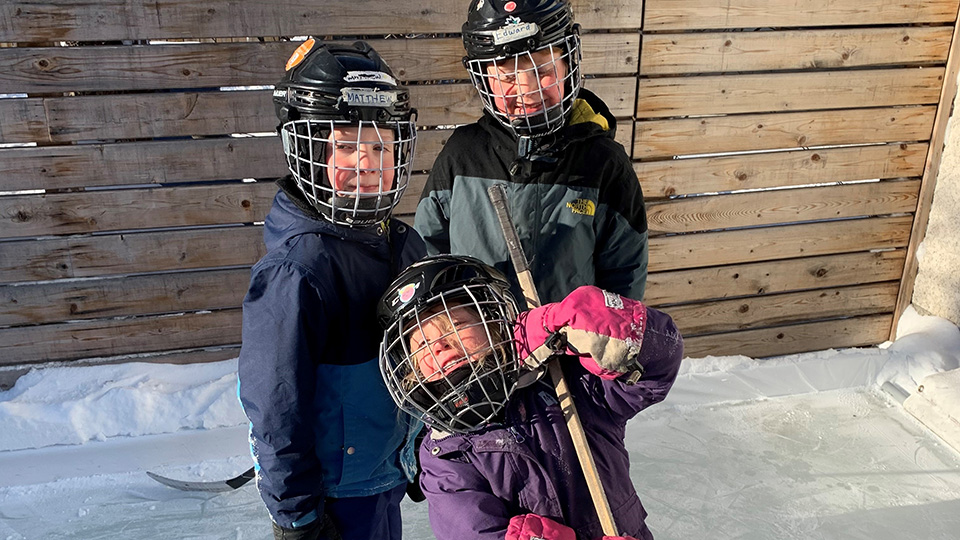
Wach got involved in coaching hockey as an assistant with Edward’s U7 team a few years ago and, since then, has taken on a variety of roles on teams, including head and assistant coach, but also overseeing hockey programming for the community centre and trying to get more volunteers to take on the many roles that are needed to put on successful sports seasons.
Any coach will tell you they have their beliefs and philosophies, and Wach strikes a balance between a focus on technical skills and ensuring the name of the game – FUN – are both attained.
“One of the most important things we try to bring forward, we can be very competitive without being overly serious about it,” Wach says. “We can come out and teach the kids to work hard, build towards something, take that long view, build up the team effort and compete to play as hard as you can and have as much fun as you can but to do that without being serious about it. When I say serious, you’re doing it to be the best you can but you’re doing it realizing what it is – and it’s still minor hockey and it’s still seven-, eight-, nine-year-olds.”
Wach is quick to continuously point out that many in the Corydon community contribute to the success of the hockey programming offered there; he is perhaps most proud of the fact that many new families to hockey – and many new families to Canada – are given the opportunity to have get their kids in the game.
He also notes that he isn’t the best coach in the family, with that title going to Chrissy, whose background playing collegiate soccer in the United States led her to become a physical education teacher who also coaches a variety of high school sports – track and field, badminton and volleyball, just to name a few.
Between their parents, the Wach kids are in good hands, as are the countless minor hockey players and athletes in their part of Winnipeg.
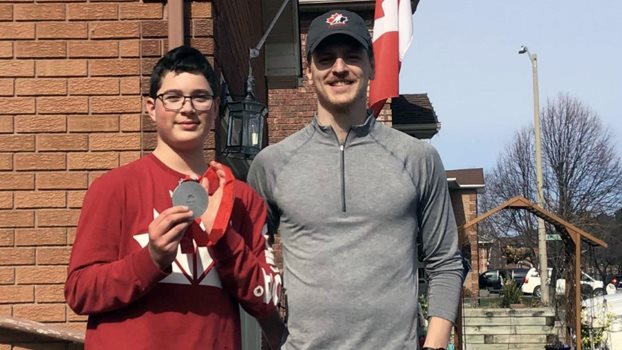
Crane finds friendship as Big Brothers Big Sisters volunteer
After quitting his full-time job to focus on Canada's National Para Hockey Team, Rod Crane filled his free time by giving back to his community
When Rod Crane received word that he made Canada's National Para Hockey Team, he knew his life would change. He just wasn’t sure how.
The Clarksburg, Ont., native knew his hockey career was about to take off, but when he quit his job to focus full-time on training for the national team in 2018-19, he found an abundance of time in his calendar. After mulling over various ideas, his mother, Christine, mentioned the Big Brothers Big Sisters of Barrie & District.
"I had been looking for a volunteer gig to help me pass the time and keep busy, and she was the one who first brought it up," says Crane, who won a silver medal at the 2022 Paralympic Winter Games. "She thought it would be a good fit, so I looked into it and got matched with a great family."
For more than a century, Big Brothers Big Sisters has been championing the health and well-being of youth, ensuring children are supported by caring adults — helping them physically, mentally, socially, emotionally and academically. This year alone, the organization has impacted over 41,000 youth in over 1,100 communities across Canada.
After going through the application process, Crane was matched with a fifth-grader named Sandro, and the two became fast friends.
"He's such a funny kid," says Crane, a defenceman who began his para hockey career in 2014 with the Elmvale Bears. "Sandro is so smart, very driven, enjoys school, speaks three languages and is just a happy-go-lucky kid. He's not as much into sports, but he's into movies, Lego and things like that; he's a blast to be around."
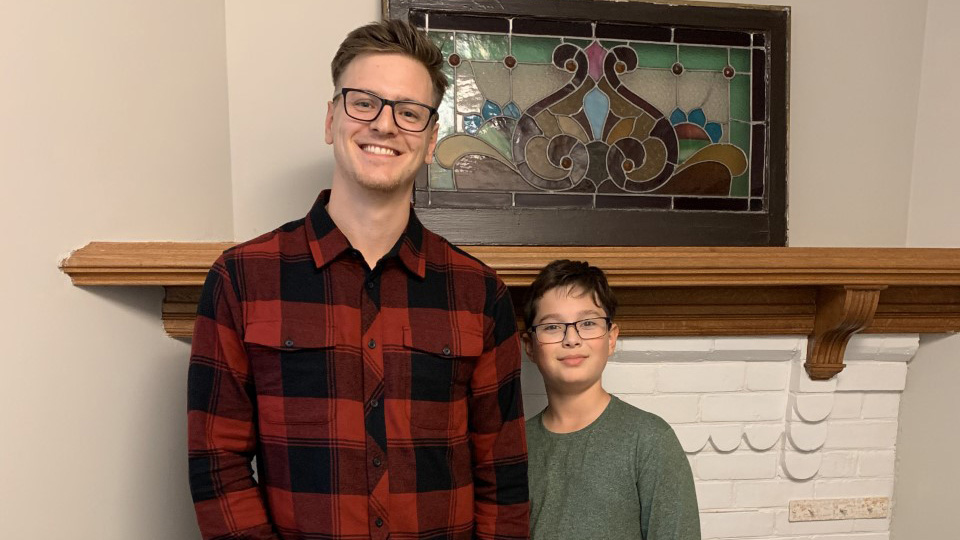
As part of the program, Crane and Sandro get together a couple of times a month, and their interactions can be as competitive as going bowling or as simple as just grabbing a bite to eat.
“It’s nice to have Rod in my life,” says Sandro. “I look up to him, he’s a great guy. We text back and forth and go do things together. It’s pretty cool to be friends.”
Considering he went into this adventure without any prior knowledge, Crane is happy with the way the relationship has evolved.
"I didn't know what I was getting into. My only idea of Big Brothers [Big] Sisters came from an episode of The Simpsons," says Crane with a chuckle. "Not only is it nice to give back to the community, but I love watching him grow. He has really come out of his shell and become his own individual."
Three years on and despite not being much of a sports fan, Sandro and Crane have become fast friends. Sandro, who is now in Grade 8, has taken a liking to the National Para Hockey Team, following it wherever it goes, including watching the 2022 Paralympics in Beijing.
“Knowing someone on the ice is a cool feeling,” Sandro added. “I’ve gone to watch Rod live a few times and now that I know what it is, I think para hockey is super entertaining. After games, I try and text him and congratulate him, but I make sure I don’t critique him too hard.”
Although it’s just an organizational name, Crane feels the Big Brothers Big Sisters program is comparable to having your own siblings.
"[Sandro] knows I'm here to talk and for him when he needs it,” says Crane. “He's in Grade 8 and just learning how to communicate, so sometimes he takes advantage of that opportunity to open up, but other times it's as simple as just a check-in text message where he asks if I'm good and vice versa. I take a lot of pride in being there for him, and I think it gives his mom some peace of mind as a single parent that he has a strong male influence in his life."
Sandro will soon have another major tournament to keep tabs on as Crane and his Canadian teammates are preparing to host the World Para Hockey Championship beginning May 31 in Moose Jaw, Sask.
"I've made a friend for life," adds Crane. He knows I am here to support him in whatever he's doing, and I know I have a fan at home cheering for me."
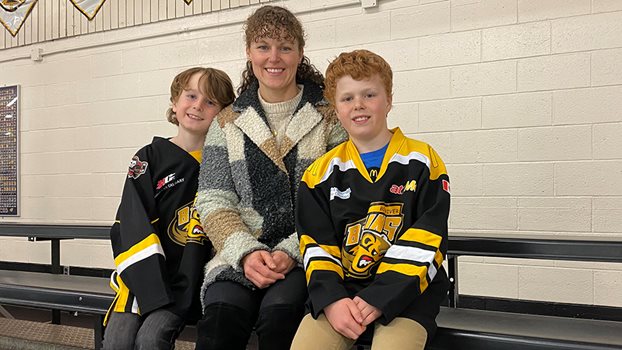
Being a volunteer: Isabelle Rioux
The team manager for the Bow River U11 Bruins talks about giving back to the game, maximizing the experience for the player and what goes into her role
Without the volunteer, there is no minor hockey in Canada – it’s really that simple. And that volunteer can come in a variety of roles.
A part of National Volunteer Week, HockeyCanada.ca chatted with Isabelle Rioux, team manager for the Bow River U11 Bruins in Calgary, to talk about her role, what it entails and why others should give their time to the game.
How did you get involved with Bow River Minor Hockey?
IR: I must admit, I was a skeptic when my husband signed our kids up to play hockey four years ago. We were a skiing family and, to me, this meant my sport was going to be put on the back burner. That's when our story with Bow River started. Without knowing it, we were joining a new community that was going to become much more than I anticipated.
How did you get involved as a team manager?
IR: Two years ago, both our sons’ teams needed a manager, so my husband and I decided to take on these positions. We had only done minor volunteering roles prior, but we sort of had the itch to be more involved. It was a steep learning curve, but we were able to bounce ideas off each other and progress together. We learned quickly that other parents have the same itch to help more, so we went with it. My first year being team manager was great! These parents became friends, and we were able to achieve all our goals off the ice so our kids and coaches had a great year on the ice. When the position was open again last season, I did not hesitate in raising my hand!
Why did you decide to volunteer your time in this role?
IR: After we saw our kids' love for playing hockey and having fun with their friends in the dressing room, we were all in. With the support of parent volunteers and Bow River Hockey, it didn’t take me long to say “I got this!” I also quickly realized that I am doing it for the kids. We want them to learn important lessons – perseverance, teamwork, leadership, etc. We also want them to have fun, and a team manager is essential in making this happen.
What exactly does a team manager do? What are the responsibilities that go into it?
IR: As a team manager, your main responsibilities are being organized, communicating efficiently, knowing all the rules, leading the team through important decisions on budgets and making sure things run smoothly throughout the season. You also need to make sure that every family volunteers and feels like they are part of the team. Working hand-in-hand with the head coach as you make decisions together to benefit the team is another vital responsibility.
What are the challenges?
IR: In general, as a team manager, you could have difficulties getting everyone to fulfill their volunteer hours. You will also need to deal with humans who have emotions. You need to listen to concerns or frustrations, and you might need to resolve conflicts between parents or kids.
What are the wins?
IR: There are multiple wins in being a team manager. First, working together to achieve goals that were set at the beginning of the season is very satisfying. Then, seeing the kids have fun, improve and be grateful for all that you do is also rewarding. But to me, the most important win is the lasting relationships and new friendships I have developed over the last two years. As I said previously, my family is now part of a community composed of people that support, encourage and help each other throughout the hockey season, and that is priceless.
What advice would you give to someone that may be interested in volunteering their time but isn’t sure what to expect?
IR: If you are interested in becoming a team manager, you need to know that it is a big time commitment, but one that is totally worth it. If you are still unsure about volunteering, talking to someone who has done it before can help in deciding if this is for you. Finding a mentor can also be useful. Yes, there are challenges but, in the end, the rewards mean so much more.
Why are volunteer roles like this one and so many others important in the local hockey association?
IR: It's very simple – without volunteers, minor hockey would be nonexistent. We need people to get involved, contribute to their community and show our kids that they matter and that we are there for them. As I said in my first answer, I was a skeptic when my kids started playing hockey four years ago. Slowly but surely, the sport has taken a special place in my heart, and being a team manager has hugely contributed to this. I now proudly call myself a Hockey Mom and I have the long black winter parka to prove it!
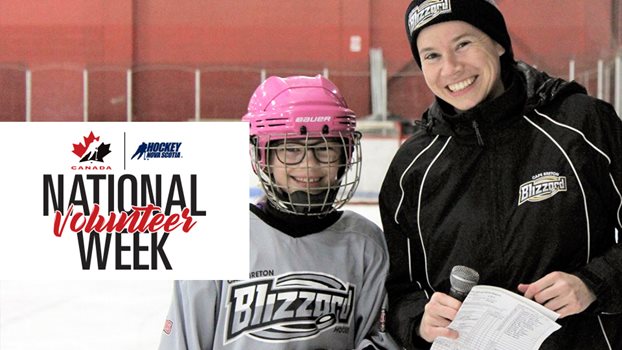
Closing the gap
A sign on a telephone pole rekindled Christina Lamey’s love of hockey, and put her on a path to make sure girls and women in Cape Breton have a place to play
“My hockey story has a bit of a gap in it,” Christina Lamey admits.
After “begging and pleading” to join a minor hockey team in her hometown of New Waterford, N.S., when she was 11 years old, Lamey’s time as the association’s only girl was short-lived.
“They wouldn’t let me join again at Peewee,” she says.
“There was just no spot for a girl.”
It would be more than 10 years later—and a move halfway across the country—before she would touch a hockey stick again.
“I was 25 years old, living in Toronto, and I saw a sign on a telephone pole that said, ‘Women’s hockey players wanted.’”
After all that time away from the game she had loved as a child, she was a little nervous when showed up at the rink.
“My first time with gear on in more than a decade, I felt like a deer on ice,” Lamey laughs.
“But after one awkward skating session, I felt like, ‘I can get this, I can get this.’”
The next time she stepped out on the fresh sheet, a certain familiarity returned.
Lamey was hooked.
“The gear offers a lot of protection, so you skate differently when you’re playing hockey than you would if you were just skating around on an ice surface somewhere. You’re chasing the puck, you’re going for it, you’re not really holding back much. That’s quite a feeling because, just in general day-to-day life, you don’t do that.
“It’s a sensation I’ve only ever experienced on the ice playing hockey.”
With her passion for the game rekindled, Lamey brought that Ontario telephone pole’s message of inclusion back to Nova Scotia with her when she moved to Halifax two years later.
As a volunteer member of the Nova Scotia Senior Women’s Hockey League’s executive, she helped the league expand its numbers of teams and increase its membership.
“All the growth in that league has been from the beginners coming into hockey,” Lamey says. “Everything has to be about the beginner and knocking down barriers so they can give [hockey] a try.”
Now she is applying those same lessons learned to girls’ hockey in Cape Breton as president of the Cape Breton Blizzard Female Hockey Association.
After two decades as a volunteer in the sport in her home province, she is as passionate as ever about making sure girls everywhere have an opportunity to play.
“I had the sense when I was a kid that something wasn’t right, but I also had that sense later on when I went to get my daughter involved in hockey and I found it wasn’t significantly better than it was in 1985,” Lamey says.
“There still weren’t girls’ teams like I had seen in Ontario and there still weren’t powerful, large women’s leagues like I’d seen in Ontario. I felt like the interest was here, but something was structurally not right with it.”
In 2015, Hockey Nova Scotia began the process of modifying its governance structure to allow for the establishment of new associations that would be committed exclusively to growing and developing girls’ hockey.
In the Cape Breton Regional Municipality, Lamey has been at the forefront of those changes. Today, her Cape Breton Blizzard Female Hockey Association is the fastest growing association in the province
“Christina has been a champion for women’s and girls’ hockey in this province and a champion for inclusion in the sport,” says Amy Walsh, executive director of Hockey Nova Scotia.
“She’s committed to the growth and sustainability of the female game here in Nova Scotia and she truly is a tireless volunteer. We’re really lucky to have people like Christina in this sport.”
While much has changed over the past seven years with the number of girls’ teams on the rise, Lamey says there is still work to be done.
“At the end of the day, a small girl looking to join hockey should have the same opportunity and cost and experience that a young male child would have.
“What are the structural problems that would stand in the way of that? Access to ice time is a big one.”
That’s why Lamey is now leading the charge to help refurbish the Canada Games Complex in Sydney, N.S. She hopes the arena, recently announced as a top-four finalist for Kraft Hockeyville’s grand prize of $250,000 for arena renovations, could soon become a home for both her growing association and women’s hockey in the Cape Breton Regional Municipality.
Thanks to the dedication and efforts of volunteers like Christina Lamey, there are going to be fewer gaps in the hockey stories of young girls in Nova Scotia.
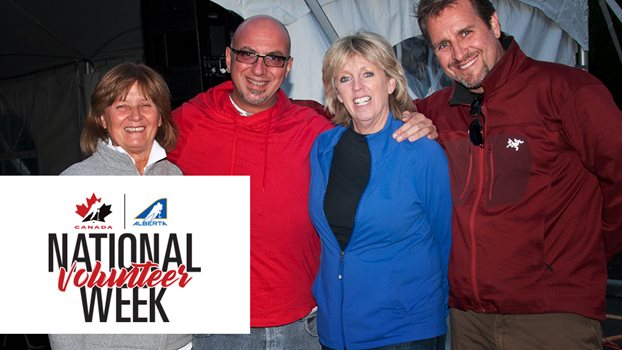
A lifetime of giving back
Through three IIHF World Junior Championships and over 30 years with Hockey Edmonton, Joan Kirillo has dedicated her life to her city
Like most hockey parents turned volunteers, Joan Kirillo got involved in the game when her kids started playing.
For over 30 years, Kirillo gave back to her community as a volunteer with Hockey Edmonton, and she served as a board member for Edmonton Minor Hockey Week for 27 years.
“From that, I got to meet some really good people,” explains Kirillo. “[Including] Al Hamilton and Ted Green.”
Identifying the need for an outdoor rink in Edmonton’s inner district, Oilers alumni Hamilton and Green, along with Father Jim Holland of Sacred Heart Church, recruited Kirillo to their committee to build what would eventually be the McCauley Community Rink.
“They just decided to give that to hockey and got the rest of us all involved and said, ‘We need help. Here, do this,’” says Kirillo. The group raised over $200,000 to build the rink, which came to life in 2012.
“They feed the kids, they have all the equipment, the kids play shinny hockey and it's still going.”
Kirillo was perfectly suited to help get the project across the finish line, working as the business manager for the Mill Woods Golf Course and a project manager for the Mill Woods Cultural and Recreation Facility Association (MCARFA), helping build the arenas that are now a part of the Mill Woods Recreation Centre, fulfilling the growing need for available ice for local hockey associations.
Kirillo and her team at MCARFA have gone on to build skate parks, running tracks and the Jackie Parker Recreation Area.
Watching her juggle her responsibilities and countless volunteer hours spent outside the projects, MCARFA director Bob Strynadka explains that Kirillo’s greatest attribute as a volunteer is her strength as a leader. “Her vision and drive make all volunteer projects and programs she gets involved a success. Her enthusiasm always rubs off on others on the team. Everyone enjoys the time spent.”
Having devoted so many years to her city and hockey associations already, it was an easy decision for Kirillo to put her hand up for the IIHF World Junior Championship when they came to Edmonton and Calgary in 2012.
“A friend of mine, Lyle Best, was the co-chair of the event back then and he got me involved and it was really, really good,” she says. “I worked on the 50/50 program sales, all the volunteers fan fair, the school program…everything.”
So when the World Juniors came back to central Alberta in 2020, albeit under much different circumstances in the midst of the COVID-19 pandemic, she jumped again at the opportunity.
“Joan was our chair of our utility committee in 2020 and 2021 which handles volunteer operations and accreditation for the event,” explains Corinne Ethier, a manager of events and properties with Hockey Canada. “Because of COVID, she had to operate under a lot of virtual guidance and took it all in stride. She’s incredibly patient and understanding, which was exactly what we needed in the situation the events were delivered under. She’s an absolute sweetheart.”
Ethier recalls Kirillo going above and beyond for the event, when the World Juniors group was in need of a back-up shipping location when the arena was unavailable. Kirillo and her team offered up the Mill Woods Golf Course, expertly navigating logistics to help the tournament staff.
When asked why she dedicates so much time to her community, Kirillo’s answer was simple: “For one thing, I love my city. I love giving back and I really love the people that you meet.”
As the World Juniors return to Edmonton this summer for a renewal of the 2022 event that was cancelled last December, Kirillo plans to stay involved, navigating her commitments with the golf course and the international event.
Still, after over 30 years of volunteering in her community she encourages others to do the same and reap the same fulfillment she has been able to.
“You’ve got to get involved. These are experiences that you will never, ever regret.”
For more information: |
- <
- >

